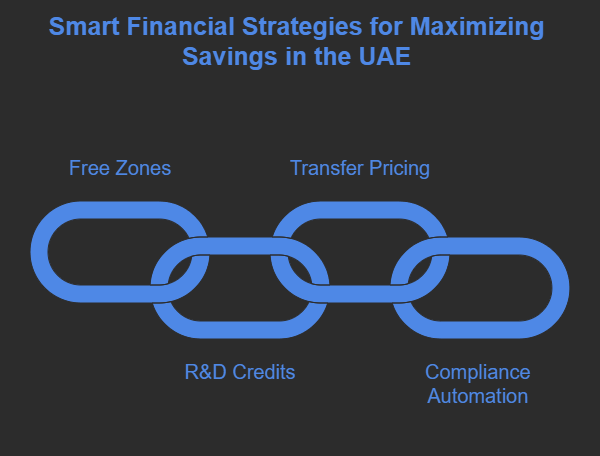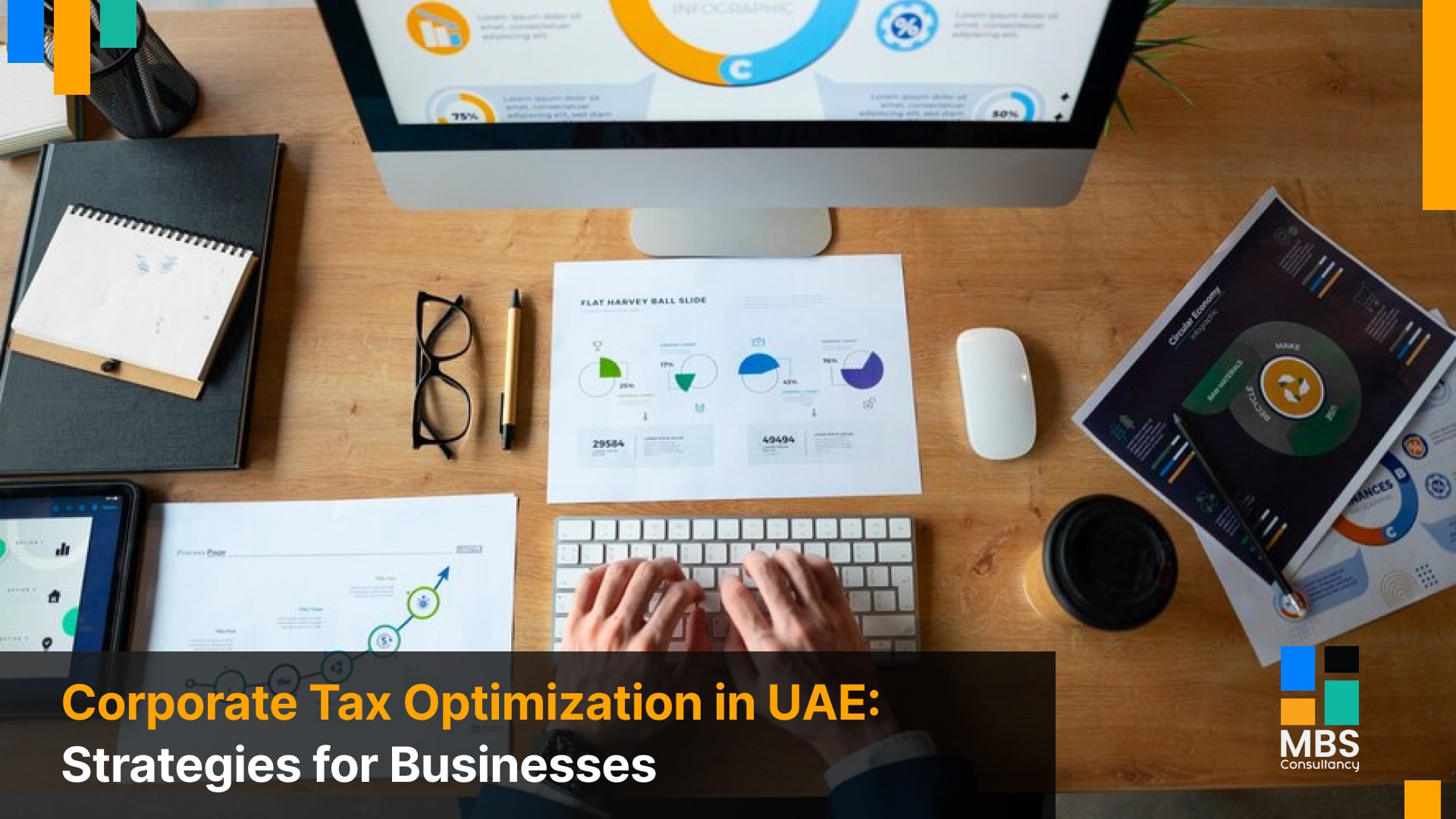Tax Optimization Isn’t Magic. It’s Just Smarter Chess
Did you know humans make 35,000 decisions daily? Now imagine your CFO sweating over just one: how to keep profits high while playing by UAE tax rules. Here’s the twist: corporate tax in the UAE isn’t a villain; it’s a puzzle waiting for your strategy.
Since the 2023 federal tax rollout, businesses have turned compliance into opportunity. Take one of our client companies in the tech sector, it slashed its liability by 22% without breaking a sweat. Ready to stop fearing taxes and start outsmarting them? Today’s blog post is going to dive right into moves that protect your margins and peace of mind.
Key Takeaways:
Businesses in the UAE face these three major tax-related issues:
- “What even is tax optimization?” (Spoiler: It’s not a loophole.)
- Fear of audits: Missing deadlines or misfiling invoices.
- Confusion over free zones vs. mainland rules.
We are going to share how to flip stress into savings, solving these above problems.
Smart Tax Moves for UAE Businesses That Just Make Sense
Corporate tax in the UAE is real, and so are the penalties for getting it wrong. Businesses that once enjoyed zero corporate tax now face new rules, paperwork, and a growing tax bill. But before you panic, know this: tax optimization is not about evading taxes; it’s about structuring your business legally to minimize liabilities.
The right tax strategy doesn’t just protect your profits. It strengthens your entire financial game. Without a solid tax plan, you’re essentially handing over more of your revenue than necessary. UAE’s corporate tax system may be business-friendly, but only for those who take the time to optimize their approach. Let’s break it down and show you how to keep more of what you earn.
What Is Tax Optimization?
Tax optimization is the legal process of reducing your tax burden through smart structuring, deductions, and exemptions. It’s the difference between overpaying and paying exactly what’s required. The goal? Keep your tax bill lean without breaking the rules.
Corporate tax in the UAE isn’t a ‘maybe’ or something up in the air. It is a must. If your business pulls in over AED 375,000 in taxable profits, you are looking at a 9% corporate tax bill.
Registration is compulsory for all businesses, even if your profits are below the threshold. Running a sole proprietorship with AED 1 million in turnover? Get registered by March 31, 2025, or brace for a AED 10,000 fine.
UAE keeps taxes business-friendly, but only if you know how to use the system to your advantage. Keep your financials airtight, understand the laws, and leverage every exemption possible. Less tax, more profit; that’s the goal!
The essentials, at a glance:
| Aspect | Details |
| Tax-Free Threshold | AED 375,000 (profits below this are exempt) |
| Registration Requirement | Mandatory for sole proprietors with AED 1 million+ turnover |
| Registration Deadline | March 31, 2025, for sole proprietors exceeding AED 1 million turnover |
| Penalty for Non-Compliance | AED 10,000 fine for failure to register |
Tax Optimization Decoded: More Than Just “Paying Less”
What even is tax optimization? It’s structuring your business to legally minimize liabilities. Think of it as financial yoga. In the UAE, this means leveraging:
- Free zone perks: 0% tax on profits for qualifying businesses.
- R&D incentives: Deduct innovation costs.
- Strategic timing: Align expenses with fiscal years.
It’s not evasion; it’s playing the game with better rules.
4 UAE-Specific Strategies to Keep Money in Your Pocket

1. Free Zones: Your Tax-Free Golden Ticket
- How it works: Operate in zones like DMCC or RAKEZ, enjoy 0% corporate tax on profits.
- Catch: Stay compliant with “substance over form” rules. No ghost offices!
2. R&D Credits: Turn Brainstorms into Tax Breaks
Dubai rewards innovators. Track R&D spend—software development, sustainability projects—and claim deductions.
3. Master Transfer Pricing (Without a PhD)
- Set fair prices for intra-company transactions.
- Use benchmark reports to avoid audit red flags.
4. Automate Compliance Like a Pro
- Sync accounting software with UAE’s e-tax portal.
- Schedule reminders for corporate tax registration deadlines.
Key Strategies for Tax Optimization in UAE
In this section, we are going into further detail about the 4 strategies we mentioned above.
1. Choose the Right Business Structure
Your legal entity impacts your tax obligations. In UAE, businesses can operate as:
- Mainland companies – Subject to corporate tax but benefit from unlimited trading freedom.
- Free zone entities – Enjoy tax incentives, with certain activities exempt from corporate tax.
- Holding companies – Designed for asset protection and tax efficiency.
Structuring your business wisely can result in significant tax savings while keeping you compliant. Free zones provide attractive incentives. Your business needs to qualify under the right category for that one, though.
2. Leverage Free Zone Benefits (While You Still Can)
Not all free zone businesses are exempt from corporate tax. UAE has a list of Qualifying Free Zone persons, where certain businesses can enjoy 0% corporate tax if they meet the right criteria.
To qualify:
- Conduct permitted activities in the designated free zones.
- Maintain adequate economic substance in the UAE.
- Avoid conducting business with the mainland (unless it’s within the allowed scope).
Miss these criteria, and your tax perks disappear. Hello, 9% corporate tax. Free zone incentives are changing, and businesses need to stay updated on eligibility requirements to avoid unexpected tax liabilities.
3. Maximize Allowable Deductions
Every dirham you save counts. Businesses in the UAE can legally reduce their taxable income by claiming deductions on:
- Operational expenses – Salaries, rent, utilities, and marketing.
- Depreciation of assets – Equipment, vehicles, and technology investments.
- Employee benefits – Including healthcare and housing allowances.
- Business-related travel and training costs – If they align with operational needs.
Claiming deductions demands accurate records. Strong accounting ensures compliance, keeping more money in your pocket. Many businesses miss out on opportunities to save taxes, simply because they fail to document expenses properly.
4. Use Transfer Pricing to Your Advantage
Does your business operate across multiple countries? Then transfer pricing rules are going to apply! What these regulations do is ensure that transactions between related entities are priced fairly and in line with market rates.
Failure to comply with OECD-aligned transfer pricing can lead to tax adjustments and penalties. Smart businesses document their intercompany transactions carefully and set up compliant pricing strategies. Cross-border businesses must maintain proper documentation and justify their pricing models to avoid scrutiny from tax authorities.
5. Optimize VAT & Corporate Tax Together
VAT and corporate tax go hand in hand. Mismanaging one affects the other. Businesses can legally reduce their tax liability by:
- Recovering input VAT on business expenses.
- Structuring transactions smartly to reduce taxable revenue.
- Avoiding double taxation by understanding tax treaties.
- Ensuring VAT compliance to prevent unnecessary penalties and fines.
Smart tax planning links VAT and corporate tax. Miss one, and you will feel it in both. Businesses should regularly audit their VAT records and adjust their pricing structures accordingly to minimize tax exposure.
6. Plan for Tax Credits & Exemptions
The UAE offers tax relief through double tax treaties (DTTs). This prevents businesses from being taxed twice on the same income in different countries.
To benefit, businesses must:
- Understand which treaties apply to their industry and location.
- Structure cross-border transactions accordingly.
- Maintain proper documentation for tax residency certificates.
- Seek expert guidance to ensure full compliance with international tax laws.
Ignoring these can mean overpaying taxes unnecessarily. Businesses with international operations should continuously evaluate tax treaty benefits to minimize tax obligations.
7. Keep Financial Records in Check
Penalties, tax audits, or even loss of tax exemptions is what waits at the other side of poor documentation. That’s why your business is required by tax authorities in UAE to maintain accurate and detailed financial records.
Best practices include:
- Implementing a reliable accounting system to track all financial transactions.
- Conducting regular financial audits to ensure compliance with UAE tax laws.
- Keeping digital records for easy retrieval for audits or any regulatory checks.
Audit and assurance services play a huge role in ensuring your business stays compliant while identifying potential tax-saving opportunities.
3 Mistakes You’re Making
These 3 mistakes might just be the deadliest silent profit killers that should be on your radar:
- Ignoring free zone updates: Rules update yearly.
- Mixing personal/business expenses: Auditors love this (and not in a good way).
- DIY tax filing: One typo = fines. Let experts handle it.
Why UAE is Great for Tax Optimization
- No federal taxes on salaries: Keep payroll simple.
- Double taxation treaties: 137+ countries to expand tax-efficiently.
- Industry-specific incentives: Tourism, tech, and green energy get VIP treatment.
Your Next Move with MBS Consultancy: From Overwhelmed to Optimized
Tax planning isn’t a once-a-year scramble. It’s a rhythm. Start by:
- Reviewing your corporate tax registration status.
- Mapping expenses eligible for deductions.
- Booking a consultation with auditors who speak “human.”
Ditch guesswork and patchworks altogether. Let’s build your tax strategy over a cup of coffee and a 30-minute free consultation call.
Stay Compliant & Tax-Efficient with Expert Support
Corporate tax planning is not a one-time fix. It’s an ongoing process. With changing tax regulations, businesses that fail to adapt risk penalties and financial losses.
Our consultancy in UAE specializes in corporate tax registration, tax planning, and audit services to help businesses stay compliant while legally minimizing their tax burden.
Why overpay when you can outsmart? Let’s optimize your corporate tax strategy today!
Final Takeaway: Profitability Is a Habit, Not an Accident
UAE rewards businesses that plan ahead. Optimize taxes, and you’ll fund growth.
Our audit team lives for spreadsheets so you can focus on scaling. Ask about pairing tax optimization with our visa services for solopreneurs ready to conquer the market.




